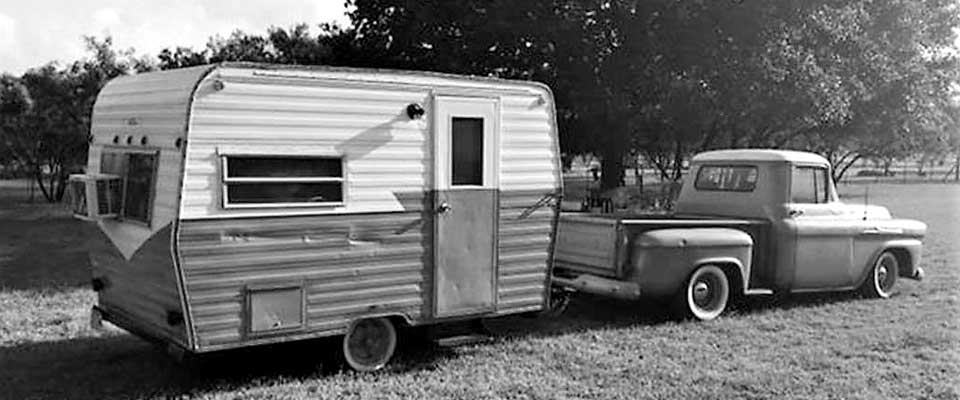
Should I travel with full holding tanks?
The quick answer, no. A gallon of water weighs 8.33 pounds. That’s probably a pretty accurate measurement for your gray tank’s contents. The black tank, with added human waste, is more likely in the 9+ pounds per gallon range.
RV holding tanks range from 30 gallons up to 70 gallons and even more. So let’s do a little math, based on the average tank capacities for three types of RVs (travel trailers, 5th wheels, and motorcoaches):
Travel trailers
Black tank: 30 to 40 gallons at 9 pounds/gallon = 270 to 360 pounds
Gray tank: 30 to 50 gallons at 8.33 pounds/gallon = 249.9 to 417 pounds
5th wheels
Black tank: 40 to 50 gallons at 9 pounds/gallon = 360 to 450 pounds
Gray tank: 40 to 70 gallons at 8.33 pounds/gallon = 333 to 583.1 pounds
Motorcoaches
Black tank: 5o to 70 gallons at 9 pounds/gallon = 450 to 630 pounds
Gray tank: 50 to 100 gallons at 8.33 pounds/gallon = 416.5 to 833 pounds
That’s a lot of weight!
The danger here – and this is much more a problem for travel trailers and fifth wheels where tanks tend to hang down from the RV’s frame is that you have a lot of weight that is putting stress on the tank and straps or hangers that are holding it in place. Motorcoaches are a bit different as their tanks tend to be more integrated into the overall construction, but you’re still looking at a lot of weight on one side of the coach.
That weight and stress while traveling could cause the tank to fall, causing severe damage to your RV and waste handling system (tanks, pipes, and connections).
The other issue to consider is your towing weight if you have a towable RV. Adding in that 600 to 800 pounds or more could be too much for your tow vehicle’s safety rating.
Yes, if you’re coming off of some boondocking, you may not have a choice other than to travel a while until you can dump the tanks. But your absolutely first stop – especially if you anticipate the tanks being pretty full – should be a dump station or other facilities such as a private RV park, truck stop, or even municipal waste treatment plant (some allow RV tank dumping for a small fee).
What about ice in your tank to help dislodge solids and anything stuck on while you travel? Well, we debunked that common RV myth in a previous article, but we do recommend that you travel with 3 to 5 gallons of fresh, clean water in your tank to help lubricate the tanks, as long as you can dump that water when you get to your destination (or, again, nearby your destination at a facility that had dump capabilities).
RECENT QUESTIONS & ANSWERS
Jim & Debbie Tome, Owners
Hi, we're Jim and Debbie Tome and we're the owners of Kleen Tank LLC, the nationally-recognized and largest professional network of RV tank cleaning service provider.
We've been RVers like you since 2004 and have traveled all over the U.S. in our Airstream travel trailer. We started the business about twelve years ago and have cleaned tens of thousands holding tanks in thousands of RVs. From tiny weekend travel trailers to monstrous fifth wheels to luxurious motorhomes, we've seen just about every situation there is with RV holding tanks and waste systems.
We hope you enjoy our question-and-answer articles; we try to post at least a couple per week and we've got a great library of them to cover just about every problem.
And if you like these short question-and-answer posts, be sure to check out our main Kleen Tank website which contains years of longer-format articles that go more in-depth on many topics. Enjoy!
Join Our eList
We publish a couple of new helpful and interesting question-and-answer-style articles every week (sometimes more often if we get a lot of owner-submissions). Subscribe to our e-list and you'll get an email alert when new questions and answers are published. You'll keep up-to-date, stay more educated, and be better able to take care of your RV!
Don't worry, we NEVER sell, loan, or share your personal information with anyone. Sign-up now!
Keep in mind that we may receive commissions when you click our links and make purchases. However, this does not impact our reviews and comparisons. We try our best to keep things fair and balanced, in order to help you make the best choice for yourself and your RV.
Have a quick inquiry? We'll get right back to you!
Don't worry, we NEVER sell, loan, or share your personal information with anyone.
![]() P.O. Box 313, Sycamore, IL 60178
P.O. Box 313, Sycamore, IL 60178
![]() 844-KLEENME (844-553-3663)
844-KLEENME (844-553-3663)
![]() info@AskKleenTank.com
info@AskKleenTank.com
![]() Facebook.com/KleenTank
Facebook.com/KleenTank
About our service
Fixes and corrects your RV's tank sensors almost every time.
Features innovative, hydrojetting technology.
Is a 100% mobile service. We come to you at your site.
Is environmentally safe and makes no mess at your site.
Is chemical-free and all-natural.

